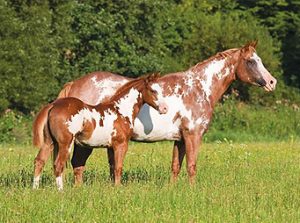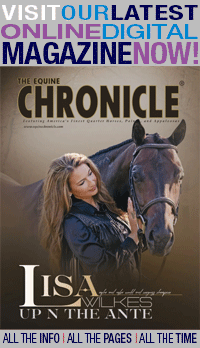Breeding Contract Basics – The Right Essentials
Click here to read the complete article44 – January/February 2019
by Delores Kuhlwein
 Spring is on the horizon, love is in the air, and so is the promise of breeding season. The excitement of what each new cross may bring is the lure and magic that motivates every mare owner. Choosing a stallion for a mare offers unrivaled anticipation. Amid the fun and frenzy of breeding is that pesky little detail of paperwork, a necessity that protects both the interests of the mare owner and the stallion owner.
Spring is on the horizon, love is in the air, and so is the promise of breeding season. The excitement of what each new cross may bring is the lure and magic that motivates every mare owner. Choosing a stallion for a mare offers unrivaled anticipation. Amid the fun and frenzy of breeding is that pesky little detail of paperwork, a necessity that protects both the interests of the mare owner and the stallion owner.
The breeding contract is one of the most important pieces of paper a mare owner can sign, so what exactly should the agreement include to safeguard the investment for both parties? We spoke with Amy Gumz, the breeding manager for Its A Southern Thing and No Doubt I’m Lazy; Don Griffey, the manager for Heartz On Fire, Rumerz, and Best Kept Secrete; and Cindy McCraw, breeding manager for Machine Made.
The Basics
When booking a stallion, the stud fee is generally the first step in the process of the breeding investment. Collection fees, booking fees, and more, plus their accompanying policies, are the norm. According to Amy Gumz, they all need to be outlined in the contract. “It basically boils down to what the final cost is going to be. Everyone needs to be aware of the out-of-pocket costs that are due with the breeding.” The most common misperception for many new mare owners is that the stud fee is all encompassing, so Cindy McCraw breaks it down simply. “What the person breeding to the stallion often doesn’t understand is that the farm doesn’t necessarily own the stallion. The stud fee goes to the stallion owner; it’s the price they’re paying to have a baby from that stallion. The booking fee is what is paid for managing that stud, and that goes to the farm,” she clarifies. “The shipped semen fee is for the actual work of getting the semen out, which takes a whole crew of people. So, many things add up. If a breeding farm had to pay for it, they would be out of business. For example, we recently spent $16,000 on a nucleo counter semen analysis machine. When a person pays for a shipment, they’re paying for these types of expenses plus shipping containers, semen extenders, lab equipment, the time to sterilize, and more.”
Don Griffey explains that instances such as donations of breedings to futurities affect the breeding farm, which still needs to cover their expenses. “Because they will not be receiving a chute fee from the paid stud fee, they will charge the chute fee to the customer to offset those costs,” he says.
Click here to read the complete article44 – January/February 2019










